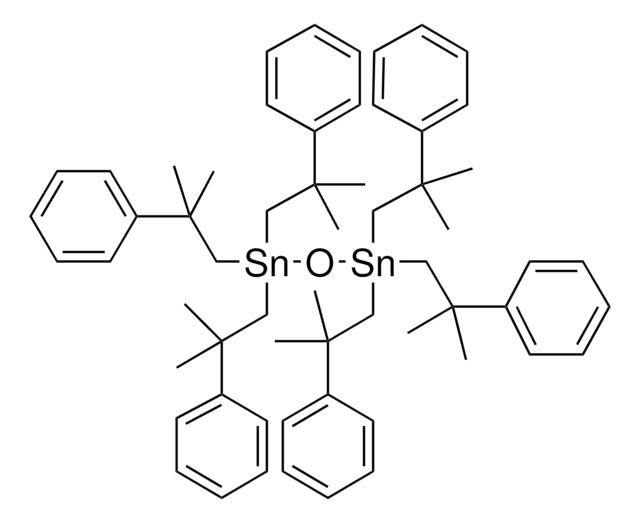CRM01303
Cyantraniliprole
certified reference material, TraceCERT®, Manufactured by: Sigma-Aldrich Production GmbH, Switzerland
Synonym(s):
3-Bromo-1-(3-chloro-2-pyridyl)-4′-cyano-2′-methyl-6′-(methylcarbamoyl)pyrazole-5-carboxanilide
About This Item
Recommended Products
grade
certified reference material
TraceCERT®
Quality Level
product line
TraceCERT®
shelf life
limited shelf life, expiry date on the label
manufacturer/tradename
Manufactured by: Sigma-Aldrich Production GmbH, Switzerland
storage temp.
2-8°C
SMILES string
O=C(C1=CC(Br)=NN1C2=C(Cl)C=CC=N2)NC3=C(C(NC)=O)C=C(C#N)C=C3C
InChI
1S/C19H14BrClN6O2/c1-10-6-11(9-22)7-12(18(28)23-2)16(10)25-19(29)14-8-15(20)26-27(14)17-13(21)4-3-5-24-17/h3-8H,1-2H3,(H,23,28)(H,25,29)
InChI key
DVBUIBGJRQBEDP-UHFFFAOYSA-N
Looking for similar products? Visit Product Comparison Guide
Related Categories
General description
Certified content by quantitative NMR incl. uncertainty and expiry date are given on the certificate.
Download your certificate at: http://www.sigma-aldrich.com
Cyantraniliprole, a second-generation diamide insecticide, activates the ryanodine receptors of insects to cause the release of Ca2+ ions resulting in muscle paralysis and death of the insect. It shows ovicidal, larvicidal, and adulticide activity, depending upon the pest species. It is used for cereal crops and vegetables, such as rice, peanuts, corn, tomatoes, green onions, and cucumbers for protection against lepidopteran and coleopteran pests.
Cyantraniliprole is approved for use in the European Union. The maximum residue limits (MRL) for cyantraniliprole in food crops, as per EU regulations are in the range of 0.01-15 mg/kg. As per a request received for cyantraniliprole MRL modification by an evaluating member state (EMS) on 28th January 2015, the EFSA has proposed an MRL of 0.5 mg/kg in strawberries, 0.2 mg/kg in the crop groups “herbal infusions from roots” and “root and rhizome spices”, 0.04 mg/kg on beans without pods, 0.15 mg/kg on peas without pods, and 0.1 mg/kg in globe artichokes. No MRL modifications were made for cherries, carrots, root and tuber vegetables, and brussels sprouts. Cyanantraniliprole is monitored in the Multiannual Control Programmes for Pesticides Residues (MACP), run within the EU and EFTA in/on products of plant origin.
Application
Cyantraniliprole certified reference material (CRM) may also find following use:
- Study of DNA damage, oxidative stress, and biological toxicity caused in earthworm by cyantraniliprole
- Development of an isotope-labelled internal standard based method using ultra-high-performance liquid chromatography-tandem mass spectrometry for the analysis of chlorantraniliprole and cyantraniliprole in fruits, vegetables, and cereals
- Simultaneous determination of 8 new generation amide insecticides by ultrahigh performance liquid chromatography-tandem mass spectrometry in complex food matrices
- Estimation of five diamide insecticides using carbon nanotube multiplug filter for sample clean-up and ultrahigh-performance liquid chromatography-tandem mass spectrometry in food matrices
- Simultaneous analysis of five diamide insecticides in edible mushrooms by high-performance liquid chromatography coupled to tandem mass spectrometry (HPLC-MS/MS) and a modified QuEChERS procedure for extraction
Recommended products
Legal Information
signalword
Warning
hcodes
pcodes
Hazard Classifications
Aquatic Acute 1 - Aquatic Chronic 1
Storage Class
11 - Combustible Solids
wgk_germany
WGK 3
flash_point_f
Not applicable
flash_point_c
Not applicable
Certificates of Analysis (COA)
Search for Certificates of Analysis (COA) by entering the products Lot/Batch Number. Lot and Batch Numbers can be found on a product’s label following the words ‘Lot’ or ‘Batch’.
Already Own This Product?
Find documentation for the products that you have recently purchased in the Document Library.
Our team of scientists has experience in all areas of research including Life Science, Material Science, Chemical Synthesis, Chromatography, Analytical and many others.
Contact Technical Service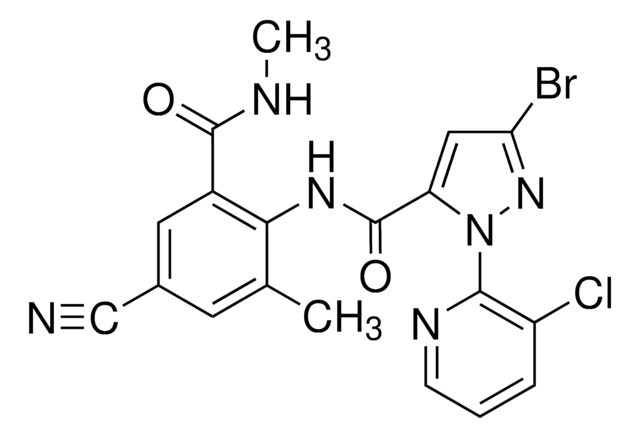

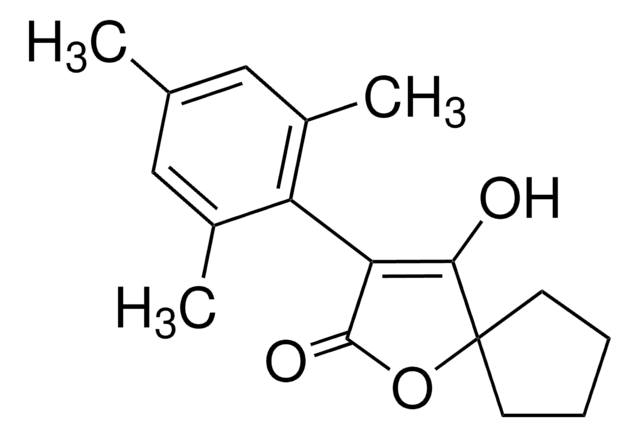
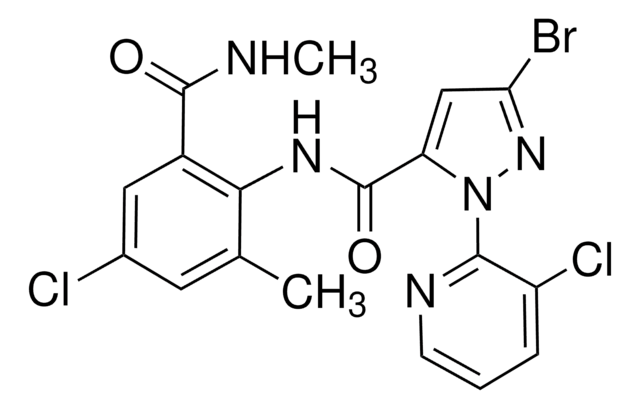
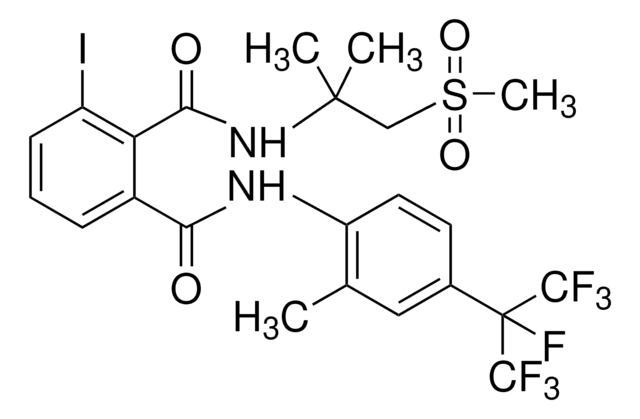
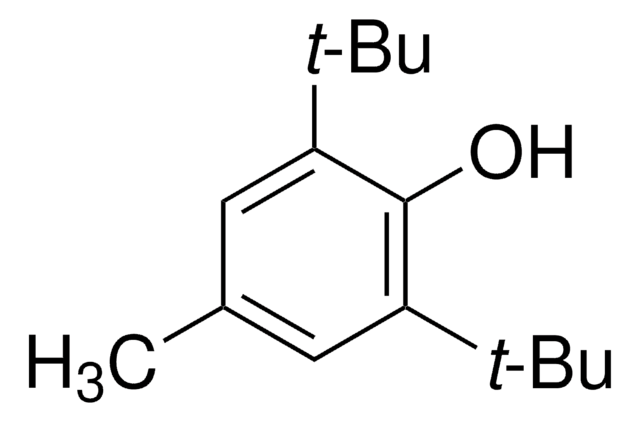
![4-[2-(5-Chloro-2-methoxybenzamido)ethyl]benzenesulfonamide British Pharmacopoeia (BP) Reference Standard](/deepweb/assets/sigmaaldrich/product/structures/101/378/bad0e801-dad2-49ac-9930-0d63d876c939/640/bad0e801-dad2-49ac-9930-0d63d876c939.png)
